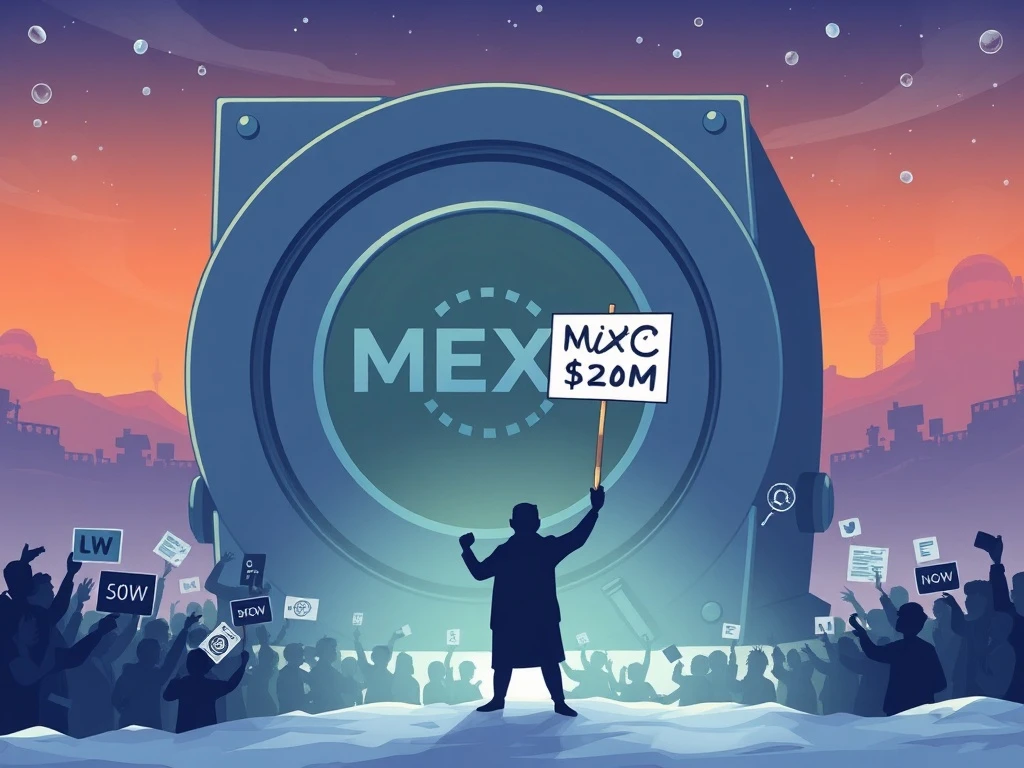Urgent Warning: MEXC Frozen Funds Spark $2M Campaign After Trader’s $3M Freeze

A critical incident has sent ripples through the cryptocurrency community, raising significant concerns about the security of user funds on centralized exchanges. Pseudonymous crypto trader “the White Whale” has launched an urgent $2 million social media pressure campaign against the digital asset exchange MEXC. This bold move follows claims that MEXC allegedly froze over $3 million of the trader’s personal funds without clear justification. This incident highlights the inherent risks associated with holding assets on centralized platforms and the challenges users face when their accounts are suddenly inaccessible. The campaign seeks to rally community support and shed light on a concerning trend of crypto account freeze incidents.
Trader Alleges Unjustified MEXC Frozen Funds
In a developing story, crypto trader Zoltan Vardai, known as “the White Whale,” has publicly accused the centralized cryptocurrency exchange (CEX) MEXC of freezing $3.1 million in his personal funds. This alleged freeze occurred in July 2025. Crucially, the trader asserts that no terms of service violations were committed. Vardai claims to have completed MEXC’s Know Your Customer (KYC) verification process previously. The exchange reportedly requested a one-year review period before unfreezing the funds, a timeline Vardai disputes.
On a Sunday X post, the White Whale announced his $2 million bounty, stating, “I’m Putting a $2M Bounty Up For Grabs (half can be claimed by YOU).” He questioned the exchange’s review process, asking, “What kind of review takes 12 months – without a single update, document, or charge?” This public challenge has ignited a debate within the crypto space. Many other traders reportedly face similar account freezes, suggesting a broader issue. The White Whale contends that successful participants are often “punished for winning” in the industry.
The $2 Million Campaign: #FreeTheWhiteWhale
In response to the alleged MEXC frozen funds, the White Whale initiated a comprehensive social media campaign. This initiative encourages users to actively participate in pressuring MEXC. The campaign outlines specific tasks for community members:
- Mint a free non-fungible token (NFT) on the Base network.
- Tag MEXC or its chief operating officer’s X account using the hashtag “#FreeTheWhiteWhale.”
- Change their profile pictures to a specific image provided by the trader.
The campaign offers substantial incentives. One million dollars of the bounty will be equally distributed among the first 20,000 NFT holders, awarding each participant $50 USDC, contingent on MEXC releasing the frozen funds. Furthermore, an additional $1 million worth of USDC will be allocated to “verified, carefully vetted charities.” The trader has promised to provide onchain receipts for these donations. This multi-pronged approach aims to leverage community power to resolve the crypto account freeze issue.

“Too Profitable”: A Trader’s Claim Against MEXC
The White Whale’s most controversial claim centers on his profitability. He alleges that his funds were frozen because he consistently outperformed the exchange’s external crypto market makers. Market makers are crucial participants in the digital asset market. They provide liquidity by placing continuous buy and sell orders, ensuring smooth trading operations. “My only conceivable offense? I was too profitable,” the pseudonymous trader stated. He further claimed, “I consistently beat their external market makers – the firms they quietly partner with to be the counterparty to trades (this is public record).”
This accusation raises serious questions about fair play on centralized exchanges. While market makers are essential for liquidity, they are sometimes viewed with suspicion by traders. Some blame them for manipulating prices, often without concrete evidence. However, research from Acheron Trading offers some context. Their study indicated that 78.5% of new crypto launches between April and June 2024 involved practices that disrupted fair price discovery. This negatively impacted both end-users and the projects themselves. Moreover, 69.9% of primary token listings were deemed “Parasitic.” This suggests market makers were exploiting premarket conditions, creating artificial scarcity and sentiment around tokens. These findings, while not directly linked to MEXC, highlight potential issues within the broader market maker ecosystem.

Implications for Trust in Digital Asset Exchanges
The ongoing dispute between the White Whale and MEXC carries significant implications for user trust in digital asset exchange platforms. Incidents of alleged MEXC frozen funds or similar account suspensions can erode confidence. Users deposit their funds with the expectation of secure and fair trading environments. When funds become inaccessible, it undermines the fundamental principle of asset ownership and control. This situation underscores the importance of due diligence when choosing a crypto exchange.
For the broader crypto community, this event serves as a stark reminder of the risks associated with centralized finance (CeFi). While CEXs offer convenience and liquidity, they also introduce counterparty risk. The White Whale’s public campaign aims not only to recover his funds but also to bring transparency to exchange practices. It calls attention to the need for clear communication and fair treatment of users. As the crypto market matures, such incidents will likely prompt greater scrutiny and demand for robust regulatory frameworks to protect traders.
Navigating the Future of Crypto Trading
The case of the White Whale and the alleged crypto account freeze at MEXC highlights a critical juncture for the industry. Traders and investors must remain vigilant. Understanding the terms of service and the operational transparency of any digital asset exchange is paramount. This incident also emphasizes the growing power of community-led initiatives in the decentralized world. Whether the White Whale’s $2 million campaign succeeds in unfreezing his funds, it has certainly brought attention to the challenges faced by individual traders on large platforms. The outcome of this dispute could set a precedent for how exchanges handle disputes with highly profitable users and the broader issue of account freezes. It reinforces the ongoing dialogue about the balance between centralized control and user autonomy in the crypto ecosystem. The community watches closely for developments from White Whale MEXC dispute, hoping for a resolution that strengthens trust in the digital finance landscape.









